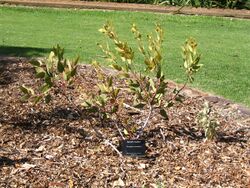Biology:Eucalyptus rameliana
| Ramel's mallee | |
|---|---|

| |
| Immature specimen in Kings Park | |
| Scientific classification | |
| Kingdom: | Plantae |
| Clade: | Tracheophytes |
| Clade: | Angiosperms |
| Clade: | Eudicots |
| Clade: | Rosids |
| Order: | Myrtales |
| Family: | Myrtaceae |
| Genus: | Eucalyptus |
| Species: | E. rameliana
|
| Binomial name | |
| Eucalyptus rameliana F.Muell.[1]
| |
| Synonyms[1] | |
|
Eucalyptus pyriformis var. rameliana (F.Muell.) Maiden | |
Eucalyptus rameliana, commonly known as Ramel's mallee,[2] is a species of low growing mallee that is endemic to desert areas of central Western Australia. It has smooth bark, broadly lance-shaped to egg-shaped adult leaves, flower buds arranged singly in leaf axils, pale yellow flowers and flattened, pyramid-shaped fruit.
Description
Eucalyptus rameliana is a mallee that typically grows to a height of 1–3 m (3 ft 3 in–9 ft 10 in) and forms a lignotuber. It has smooth greyish to brown bark. The adult leaves are the same shade of dull green on both sides, egg-shaped to broadly lance-shaped, 50–110 mm (2.0–4.3 in) long and 23–50 mm (0.91–1.97 in) wide on a petiole 10–25 mm (0.39–0.98 in) long. The flower buds are arranged singly in leaf axils, sometimes in groups of three, on a down-turned peduncle 7–17 mm (0.28–0.67 in) long, the individual buds on pedicels 5–12 mm (0.20–0.47 in) long. Mature buds are oval to spherical, 25–37 mm (0.98–1.46 in) long and 15–27 mm (0.59–1.06 in) wide with a conical, or rounded and beaked operculum. Flowering mainly occurs from May to June and the flowers are usually pale yellow, sometimes red. The fruit is a woody, flattened pyramid capsule 12–17 mm (0.47–0.67 in) long and 23–35 mm (0.91–1.38 in) wide with the valves protruding slightly. The seeds are grey brown, flattened pyramid-shaped, 2.5–4.5 mm (0.098–0.177 in) long.[2][3][4]
Taxonomy
Eucalyptus rameliana was first formally described in 1876 by the botanist Ferdinand von Mueller his book, Fragmenta Phytographiae Australiae.[5][6] The species was named in honour of Prospero Ramel who had introduced different species of Eucalypts into Algeria and southern France.[3]
Distribution
Ramel's mallee is only known from the Little Sandy Desert south-east of Newman where it grows on sand dunes and swales.[2][3]
Conservation status
This eucalypt is classified as "not threatened" by the Western Australian Government Department of Parks and Wildlife.[2]
See also
References
- ↑ 1.0 1.1 "Eucalyptus rameliana". Australian Plant Census. https://biodiversity.org.au/nsl/services/apc-format/display/101406.
- ↑ 2.0 2.1 2.2 2.3 "Eucalyptus rameliana". FloraBase. Western Australian Government Department of Parks and Wildlife. https://florabase.dpaw.wa.gov.au/browse/profile/5758.
- ↑ 3.0 3.1 3.2 "Eucalyptus rameliana". Euclid: Centre for Australian National Biodiversity Research. https://apps.lucidcentral.org/euclid/text/entities/eucalyptus_rameliana.htm.
- ↑ Chippendale, George M.. "Eucalyptus rameliana". Australian Biological Resources Study, Department of the Environment and Energy, Canberra. https://profiles.ala.org.au/opus/foa/profile/Eucalyptus%20rameliana.
- ↑ "Eucalyptus rameliana". APNI. https://id.biodiversity.org.au/instance/apni/455677.
- ↑ von Mueller, Ferdinand (1876). Fragmenta phytographiae Australiae. Melbourne: Victorian Government Printer. p. 84. https://www.biodiversitylibrary.org/item/7227#page/84/mode/1up. Retrieved 9 December 2019.
Wikidata ☰ Q15354842 entry
 |

